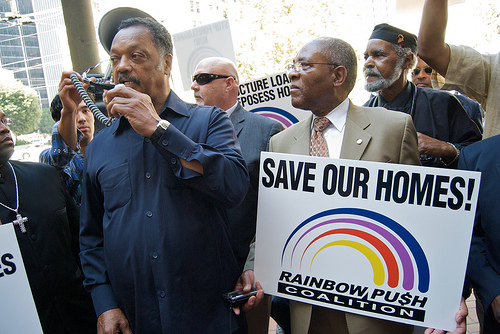News
Rev. Jackson's endorsement of NATO protest strengthens bond between anti-poverty, anti-war groups

By YanaKunichoff
Story Source
Since plans for the NATO summit in Chicago were announced, advocates working on issues of poverty in Chicago have found increasingly common cause with anti-war protesters.
The endorsement of the May 20 march against NATO earlier this month by Rev. Jesse Jackson, along with support from Rev. Phil Blackwell, National Nurses United and members of the Service Employees International Union, represents the latest stage in this collaboration.
Lauren Love, a spokeswoman for Rainbow Push, told The Chicago Reporter that this alliance has been a fairly recent move.
“Rev. Jackson’s position is that we must shift our priorities from war abroad to war at home,” said Love, "and with the collapse of the housing industry and the rise of the Occupy movement, we are making these connections and speaking more about it.”
Organizers also have a rich historical precedent they hope to build on, said Eric Ruder, an organizer with CANG8, the lead group organizing against the NATO summit.
"When we went down to meet with Jesse Jackson to discuss ... more engagement from Rainbow PUSH and other clergy, one of the things that Jackson spoke about was the history of this kind of collaboration," said Ruder, "brought to life by Martin Luther King Jr. and his Beyond Vietnam speech."
In the April 1967 speech on the connections between peace and civil rights, King spoke about how he "was increasingly compelled to see the war as an enemy of the poor and to attack it as such," and his realization that "the war was doing far more than devastating the hopes of the poor at home. It was sending their sons and their brothers and their husbands to fight and to die in extraordinarily high proportions relative to the rest of the population."
The goal in Chicago, said Ruder, was a "historic reenactment" of that alliance that King called for in his speech:
"We still have a choice today: nonviolent coexistence or violent coannihilation. We must move past indecision to action. We must find new ways to speak for peace in Vietnam and justice throughout the developing world, a world that borders on our doors."
The estimated cost of the NATO summit, originally expected to encompass the G8 gathering as well before it was moved to Camp David, was between $40 million and $65 million. The expected costs without the G8 summit are likely to be at least $58 million - $19.1 million of which will be covered by the federal government. Chicago has to pay the rest.
Meanwhile, planned public service cuts continue. This week is the last working week of three mental health clinics whose closing was pushed through to help Chicago’s $635.7 million budget deficit.
There has been some resistance to these measures, notably in the form of an attempted occupation of the Woodlawn Mental Health Clinic, which ended in 23 arrests, and the subsequent tent camp, which was disbanded for the second time last night.
Dennis Kosuth, a nurse who works at Stroger Cook County Hospital and is part of the union National Nurses United, said in a press release announcing Jackson's endorsement of the march that the cuts he sees every day make him critical of money spent on the military.
“As an ER nurse, I see the suffering of the 99 percent firsthand. The global 1 percent and the G8 are calling for austerity cuts to vital social services while draining trillions of our tax dollars into the NATO war machine. Our tax dollars should be going into our public schools, healthcare services, libraries, public transportation—back to the people of Main Street. Registered nurses of the National Nurses United will be marching alongside CANG8 this May to protest NATO and to call for a Robin Hood Tax on the global 1 percent."
© Community Renewal Society 2012